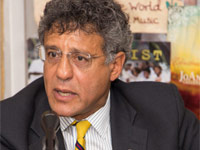Examples abound of government-supported homophobia in the Caribbean. In a recent UN resolution to condemn arbitrary killings based on various identity features, nearly all Commonwealth Caribbean states voted to remove “sexual orientation” as a category. With the exception of the Bahamas, former British colonies of the region all retain laws criminalising male homosexuality. These laws either date back to, or are a literal transplantation of the Victorian 1861 Offences against the Person Act. Offences of “buggery” or anal sex and “gross indecency” meaning any sexual intimacy between men, remain on the books.
A judge once said that the risk of prosecution in places where sodomy laws exist makes gay men into “unapprehended criminals”. In HIV prevention and care, the anti-homosexuality proscriptions are obstacles that reinforce societal stigma and discrimination.
Ian McKnight, executive director of Caribbean Vulnerable Communities (CVC) – a coalition of interests representing high-risk groups in the fight against HIV and Aids in the Caribbean, says the law makes reaching out to men who have sex with men (MSM) a high-wire operation: “Outreach workers face harassment for distributing condoms. The police aren’t afraid to throw the book at anyone.”
In 1967 consensual homosexual acts were decriminalised in England and Wales. In the case of Dudgeon v UK in 1981, the European court of human rights agreed with a gay man from Northern Ireland that though he had not been prosecuted under the provisions of the 1861 Act, the “maintenance in force of the impugned legislation constitutes a continuing interference with the applicant’s right to respect for his private life”.



